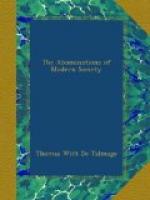Intemperance soon stigmatizes its victim—kicking him out, a slavering fool, into the ditch, or sending him, with the drunkard’s hiccough, staggering up the street where his family lives. But gambling does not, in that way, expose its victims. The gambler may be eaten up by the gambler’s passion, yet only discover it by the greed in his eyes, the hardness of his features, the nervous restlessness, the threadbare coat, and his embarrassed business. Yet he is on the road to hell, and no preacher’s voice, or startling warning, or wife’s entreaty, can make him stay for a moment his headlong career. The infernal spell is on him; a giant is aroused within; and though you bind him with cables, they would part like thread; and though you fasten him seven times round with chains, they would snap like rusted wire; and though you piled up in his path, heaven-high, Bibles, tracts and sermons, and on the top should set the cross of the Son of God, over them all the gambler would leap like a roe over the rocks, on his way to perdition.
Again, this sin works ruin by killing industry.
A man used to reaping scores or hundreds of dollars from the gaming-table will not be content with slow work. He will say, “What is the use of trying to make these fifty dollars in my store when I can get five times that in half an hour down at ’Billy’s’?” You never knew a confirmed gambler who was industrious. The men given to this vice spend their time not actively employed in the game in idleness, or intoxication, or sleep, or in corrupting new victims. This sin has dulled the carpenter’s saw, and cut the band of the factory wheel, sunk the cargo, broken the teeth of the farmer’s harrow, and sent a strange lightning to shatter the battery of the philosopher.
The very first idea in gaming is at war with all the industries of society. Any trade or occupation that is of use is ennobling. The street sweeper advances the interests of society by the cleanliness effected. The cat pays for the fragments it eats by clearing the house of vermin. The fly that takes the sweetness from the dregs of the cup compensates by purifying the air and keeping back the pestilence. But the gambler gives not anything for that which he takes.
I recall that sentence. He does make a return; but it is disgrace to the man that he fleeces, despair to his heart, ruin to his business, anguish to his wife, shame to his children, and eternal wasting away to his soul. He pays in tears and blood, and agony, and darkness, and woe.
What dull work is ploughing to the farmer, when in the village saloon, in one night, he makes and loses the value of a summer harvest? Who will want to sell tape, and measure nankeen, and cut garments, and weigh sugars, when in a night’s game he makes and loses, and makes again, and loses again, the profits of a season?
John Borack was sent as mercantile agent from Bremen to England and this country. After two years his employers mistrusted that all was not right. He was a defaulter for eighty-seven thousand dollars. It was found that he had lost in Lombard street, London, twenty-nine thousand dollars; in Fulton street, New York, ten thousand dollars; and in New Orleans, three thousand dollars. He was imprisoned, but afterwards escaped and went into the gambling profession. He died in a lunatic asylum.




